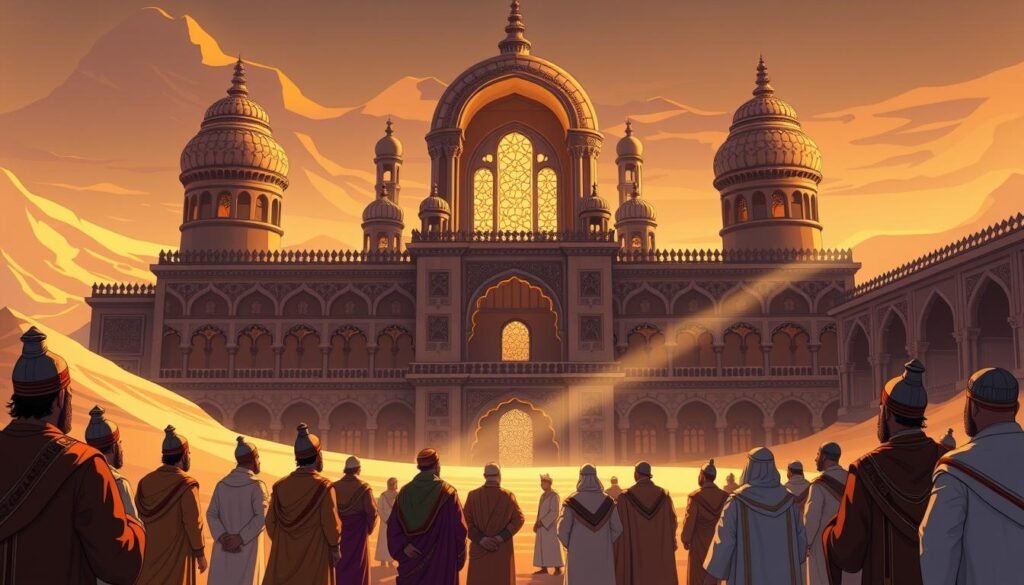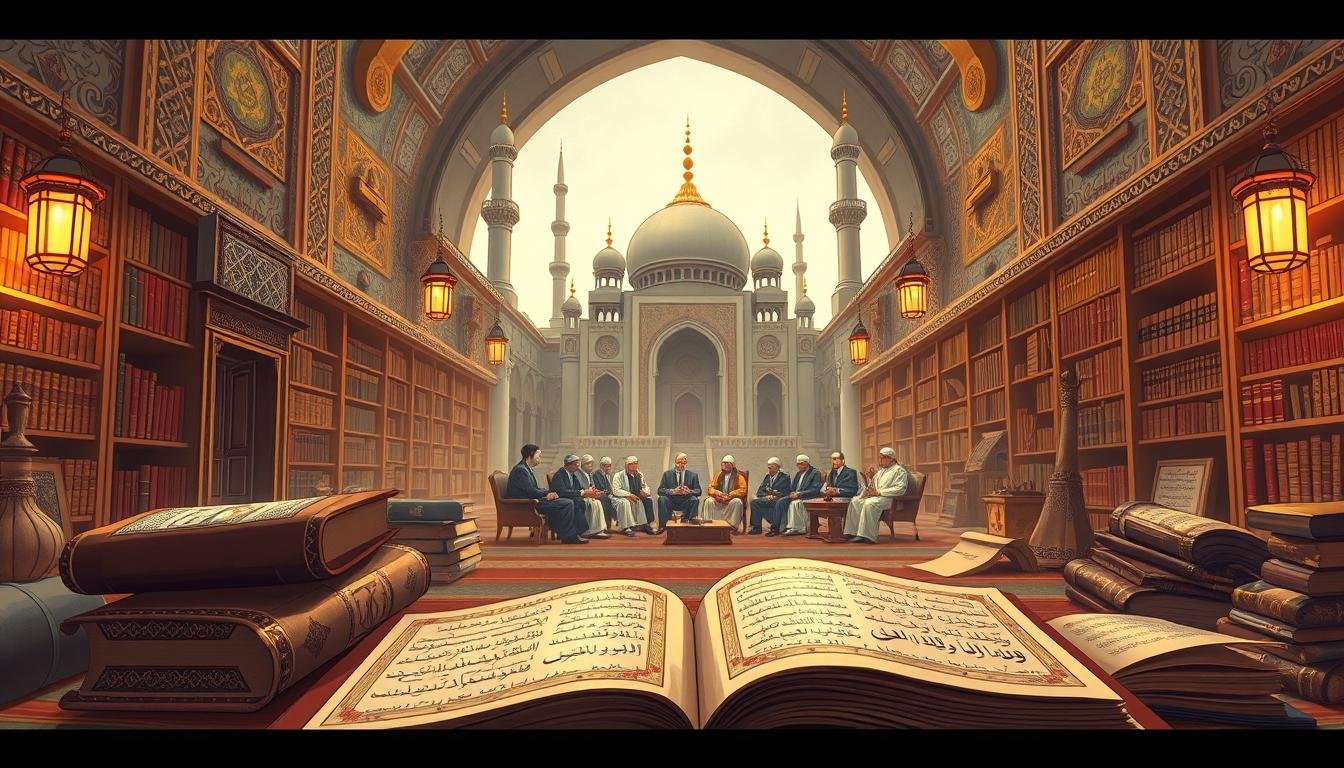Have you ever wondered where loyalty lies when faith meets tradition? For millions of Muslims today, the debate over can a Muslim be a Mason is very important. It touches on identity, faith, and community.
As a researcher, I’ve seen families torn by this issue. Grandfathers joined lodges in Jakarta, while students in Cairo debate Islamic rulings on Freemasonry. Converts struggle with symbols like the All-Seeing Eye on American currency. The answers are very important.
Behind the whispers of conspiracy theories and old fatwas, there’s a big divide. Scholars like the Permanent Committee in Saudi Arabia say Freemasonry is haram. They say its secret oaths go against Islam’s call for openness. Yet, others believe that good intentions can make joining a lodge okay.
This article doesn’t just repeat debates; it breaks them down. We’ll look at lodges in Batavia in 1767 and the Dutch East Indies’ 25 lodges by 1800. We’ll also see how even Atatürk’s Turkey had Masonic ideals while keeping Islamic governance.
Why does this matter now? With global tensions over religious identity and distrust of secret societies, this is more than history. It’s a mirror to today’s struggles. We’ll explore Freemasonry’s six core principles and Quranic teachings. You’ll see why symbols like the pyramid on the dollar bill cause big debates.
This journey isn’t about taking sides but understanding. It’s why your mosque’s imam might quote old fatwas while your cousin in Morocco goes to lodge meetings. Let’s start with questions.
Understanding Islam’s Core Principles and Beliefs
At the heart of Islamic faith lies Tawhid—the belief in one God. This principle shapes every aspect of a Muslim’s life. Islamic principles rooted in Tawhid reject any form of partnership with the divine, ensuring loyalty to Allah alone. When evaluating practices like Freemasonry, this theological foundation becomes critical.
Monotheism (Tawhid) in Islamic Theology
Sharia law requires Muslims to uphold Tawhid by avoiding rituals that imply multiple sources of authority. The Quran emphasizes, “There is no deity but Allah”—a creed incompatible with systems blending non-Islamic symbols or oaths. Questions arise: Does Freemasonry’s symbolism align with this purity of belief?
The Importance of Sharia Law in Muslim Life
Sharia guides ethical decisions, from trade to social contracts. It evaluates groups like Freemasonry through criteria of religious compatibility. Legal scholars examine Masonic oaths—do they conflict with Sharia’s demand for transparency in faith?
Prohibited Practices in Islam (Haram)
Actions violating Tawhid or Sharia are deemed haram. Rituals involving secret oaths or idolatrous symbols risk crossing into prohibited territory. This framework helps Muslims discern permissible versus forbidden associations.
What is Freemasonry: Origins, Principles, and Practices
Freemasonry started in 1717 when London lodges came together. They formed England’s first Grand Lodge. It grew from old stonemasons’ guilds.
Today, Freemasonry has 2 to 6 million members worldwide. But, British and French lodges have fewer members. They went from 500,000 in England to 170,000 by 2023.
Its main teachings are brotherhood, moral growth, and helping others. Rituals use tools like the square and compass. These symbols mean living ethically.
Members go through three degrees. The ‘Great Architect of the Universe’ is a key idea. It lets people connect Masonic beliefs with their faiths, like Christianity or being unsure.
Freemasonry spread to Muslim areas during colonial times. It reached the Dutch East Indies and British India. In 19th-century Egypt, Sayyid Jamal ad-Din al-Afghani mixed Masonic ideas with reform.
This shows how Masonic lodge Islam and colonial ideas met. It’s a part of history that links cultures and faiths.
Masonry says it’s not about religion, but its secrets and oaths are debated. Scholars look at its teachings against Islamic law. This helps us understand the past and today’s faith talks.
The Historical Relationship Between Islam and Freemasonry
Freemasonry in Islam has changed over centuries. Colonial Freemasonry came to Muslim areas with big plans. It changed how people lived and ruled.
In places like Dutch Indonesia and British India, lodges were key. They were where rich people from both sides met. This led to both working together and fighting each other.

Freemasonry’s Spread in Muslim-Majority Countries
In 1767, Dutch colonists started La Fidele Sincerity in Batavia. This was when Freemasonry first came to what is now Indonesia. Lodges there looked like the Dutch rule, but they also helped locals fight back.
By the 19th century, lodges in Egypt and Lebanon were important. They were where Arab nationalists talked about change. They mixed new ideas with Masonic symbols.
Notable Muslim Freemasons Throughout History
Sheikh Muhammad Abduh from Egypt was interested in Masonic ideas. But how much he was involved is not clear. In India, Syed Ameer Ali, a famous Islamic scholar, joined lodges in Britain. He wanted to talk to people of different faiths.
These people faced hard choices between their faith and Masonry. They showed how Freemasonry could be both good for change and bad for colonial rule.
Colonial Influence on Masonic Lodges in Islamic Regions
In Egypt, the 19th-century khedives let Masonic lodges to modernize. But Islamic scholars saw them as wrong. In contrast, the Ottoman Sultan banned Freemasonry in 1738 because of Europe’s strict rules.
This mix of views is seen today. Some see Freemasonry as a way to modernize. Others see it as a threat to their culture. Islamic scholars keep debating if it fits with Sharia law.
Can a Muslim Be a Mason? The Central Question Examined
At the heart of this debate is a big question. It’s about faith and how we act. Islam says we must only worship one God. But Masonic rituals use symbols that might seem to suggest more than one God.
The Quran tells us to only worship Allah. This makes some people worry about Masonic oaths. These oaths seem to go beyond what Islam teaches.
Theological Conflicts Between Islamic Beliefs and Masonic Oaths
Masonic oaths and Islam meet at important points. A 2021 fatwa says taking oaths to non-Quranic creeds is wrong. It calls it kufr (disbelief).
A hadith says our actions are guided by our intentions. This means even good-hearted Muslims might make mistakes. They might not know enough about Masonry’s beliefs.
In 1932, a group called ROCOR Synod said Masonry is wrong. They said its secrets and symbols are against Sharia.
Issues of Divided Loyalty and Brotherhood
In Islam, brotherhood means being part of the ummah. But Masonic secrecy asks for loyalty to its rituals. This creates a big choice.
Does taking Masonic oaths weaken our commitment to Islam? The number of Masons in the U.S. has dropped a lot. This shows changes in society, but the spiritual problem remains.
Can a Muslim balance these loyalties? The answer depends on understanding our intentions. Scholars are debating this, looking for a clear answer.
Major Islamic Scholarly Positions Against Freemasonry
Islamic scholars have always said Freemasonry goes against Islamic values. Places like Al-Azhar University and the Muslim World League say Masonic secrets are against the Quran’s call for openness. In 1978, the Islamic Jurisdictional College called Freemasonry a “dangerous ideology” that goes against believing in one God.
“Any Muslim who joins Freemasonry, knowing its goals, is no longer a Muslim,” said the IJC in 1978. This shows worries about Masonic oaths and Islamic loyalty to Allah alone.
Fatwas from Saudi Arabia and Malaysia say Freemasonry wants to destroy religions. The 1903 World Masonic Conference wanted to take down religious systems. This goes against Sharia’s rule to keep divine unity.
The 1964 Egyptian ban came after lodge members were caught spying. This made people even more scared of Masonry’s political plans.
Scholars say Masonry’s 1877 move to remove God from French lodges shows it’s against monotheism. When Morocco’s Grand Lodge started in 2000, critics said it kept old, divisive plans. The 1922 Masonic Acacia magazine even said it wanted to control religious groups.
These decisions show a clear view: Freemasonry’s secrets and history of fighting religions make it wrong for Muslims. As we look deeper, we’ll find different opinions. But this main view is key to the discussion.
Arguments From Islamic Scholars Who Take a More Nuanced Approach

Some Islamic scholars look at Freemasonry in a conditional analysis. They see its social side as different from its core beliefs. While most say it’s haram, a few think some actions—like charity or networking—might not go against Islam.
This view says we should look at each case carefully. It tells Muslims to use Sharia’s ethical rules to judge these practices.
Whoever joins the Freemasons without knowing their secret agenda—avoiding rituals against Islam—is not automatically seen as a disbeliever. Their status depends on their intent and actions.
Distinguishing Social vs Spiritual Aspects
Dr. Tariq Ramadan suggests looking at Freemasonry’s charity work apart from its secret oaths. He says social solidarity goals, like helping the needy, match Quran’s values of kindness (2:177). For Muslim Freemasons in non-spiritual roles, some rules allow them to participate.
But only if they avoid idolatry and loyalty conflicts.
Conditions for Conditional Participation
These nuanced views on Freemasonry often come with rules. No secret rituals, no Masonic beliefs, and Islamic brotherhood first. A 2020 fatwa by the European Council for Fatwa and Research says Muslims can go to public Masonic events for humanitarian causes.
But only if they don’t commit to non-Islamic beliefs. These discussions warn against putting group loyalty above Quranic teachings.
Debating this topic means avoiding oversimplification. It’s like the discussions about Muslim logical fallacies. The big question is: Can one be in Masonic spaces without losing their Islamic identity? Scholars who take a nuanced view say yes, but only by sticking to Sharia’s rules.
The Question of Secrecy: Islamic Perspectives on Masonic Rituals
Islamic tradition values openness in faith and community. But Masonic oaths and Islam disagree on secrecy. The Quran wants clear worship, unlike Masonic rituals that are mysterious.
“Freemasonry would take the place of places of worship,” declared a 1903 Masonic resolution, revealing its ambition to overshadow religious institutions. Such goals directly oppose Islam’s insistence on monotheistic devotion.
Concerns About Oaths and Secretive Ceremonies
Masonic oaths ask for loyalty to unseen powers, which goes against Islam’s belief in one God. The Prophet Muhammad said, “Whoever innovates anything into this matter of ours, will have it rejected.” This secrecy could be seen as a sin.
Scholars say swearing by symbols or leaders other than Allah is shirk—a big sin. This goes against Islamic teachings.
Compatibility of Masonic Symbolism With Islamic Teachings
The square, compass, and hammer are Masonry’s symbols of morality. But where they come from is not clear. Critics say symbols like the Star of David bring in ideas from other traditions.
Islamic teachings focus on symbols that reflect Quranic values like justice. The story of Hiram Abiff’s death, for example, doesn’t match the Quran. This raises doubts about its spiritual value.
Debates on this topic continue. Muslims are encouraged to look into modern ethical issues through Islamic law. The Prophet’s advice to “ask about things you do not know” helps keep faith clear.
Fatwas and Religious Rulings on Freemasonry
Islamic scholars have studied Freemasonry for centuries. The Permanent Committee for Islamic Research and Fatwa in Saudi Arabia says joining Freemasonry is disbelief (kufr). They demand repentance.
This view is shared by Egypt’s Dar al-Ifta and Malaysia’s National Fatwa Council. They all say Masonic membership is wrong.
“The real enemy of man is religion,” declared the Masonic Grand Lodge in 1922—a statement directly challenging Islamic principles. Such ideologies clash with Sharia’s emphasis on transparency and communal accountability.
Islamic scholars point out Freemasonry’s secret oaths and anti-religious past. The Muslim World League called Masonry a “destructive system undermining faith” in 1974. Scholars say if you don’t know Masonry’s goals, you must leave it. But if you keep joining after learning, you face big problems.
Rules on Freemasonry vary by region. Saudi Arabia bans it strictly, but some Southeast Asian scholars want to change local lodges. This shows Islam can adapt to different cultures while keeping its core values.
For more on how Islamic law deals with modern issues, see how rulings evolve with societal shifts.
It’s important to understand Freemasonry’s history of opposing religion. Open talks and education help protect faith from hidden threats. Scholars say knowing the truth helps communities stay strong against harmful ideas.
Regional Differences in Islamic Approaches to Freemasonry
I’ve looked into how history affects Islamic views on Freemasonry. In the Middle East, debates often touch on colonial pasts and political mistrust. Southeast Asia’s views are less known but just as important. These differences show how culture shapes religious opinions.
Middle Eastern Perspectives
Masonic lodges in Syria and Jordan started during British rule. This has tied Freemasonry to local politics. Scholars like Lebanon’s Grand Mufti have banned joining, saying it goes against the Quran’s openness.
Figures like Rafik Hariri’s Masonic connections have raised questions about loyalty. The presence of the Grand Lodge of Israel also sparks debates about Zionism and Freemasonry.
Southeast Asian Perspectives
But Southeast Asia doesn’t have the same Masonic history as the Middle East. Scholars in Indonesia or Malaysia might look at Sharia and Freemasonry without the same political issues. Yet, there’s not much research on their views, showing a need to understand their unique perspectives.
These differences show Islamic thought changes based on local contexts. Muslims everywhere are trying to find a balance between tradition and modernity.
FAQ
Can a Muslim be a member of Freemasonry?
What is Tawhid in Islam?
How does Sharia law influence a Muslim’s social involvement?
What are common prohibited practices (haram) in Islam?
What are the origins of Freemasonry?
How did Freemasonry spread in Muslim-majority countries?
Were there notable Muslim Freemasons in history?
What are the predominant scholarly opinions on Freemasonry within the Islamic tradition?
Are there scholars who offer a more nuanced approach to Freemasonry?
What are the Islamic views on secrecy in relation to Masonic practices?
What significant fatwas exist regarding Freemasonry, and who issued them?
How do regional differences affect Islamic attitudes toward Freemasonry?

Embracing Faith, One Insight at a Time!
The teachings of the Quran have always guided my path. With a deep passion for Islamic knowledge, I strive to blend the wisdom of tradition with the relevance of today, making the timeless messages of Islam accessible and meaningful for everyone.
Muslim Culture Hub is my platform to share historical insights and thought-provoking articles, exploring both well-known and lesser-discussed aspects of Islamic culture and beliefs. My mission is to create an inclusive online space where everyone can learn, strengthen their faith, and connect with the profound message of Islam.
Join the journey!
May peace be upon you.








